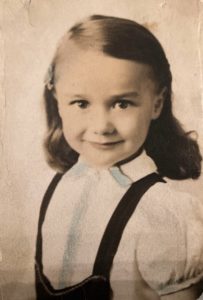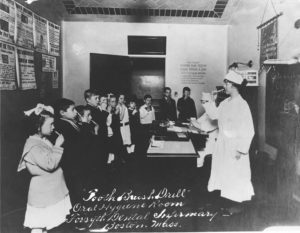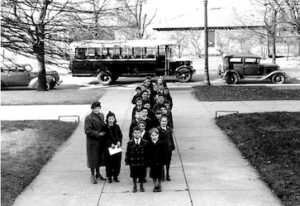By Jill Sirko and David Weafer
Since Forsyth opened its doors in 1914, hundreds of thousands of children in the community have received much-needed dental care. Those of us who work at Forsyth now have often wondered about what the ForsythKids program looked like in those early days. We recently got some answers.
We want to share with you this remarkable story of one family, spanning 80 years, three individuals, and a series of unexpected coincidences that connect (and reconnected) each of them to Forsyth.
Two chance encounters
A few months ago, we invited Daniel Burke, Chief Enterprise Strategy Officer at Pacific Dental Services (a dental support organization), to speak at one of Forsyth’s conferences. During his panel, Dan casually mentioned that his mother Rosemary had been a Forsyth Kid. Rosemary, now in her 80’s, was among the elementary school students in the greater Boston area that Forsyth would pick up and bring back to the clinic for treatment. While at Forsyth, they also learned how to take care of their own teeth.
“I was unaware of the role that Forsyth Institute and the Forsyth Kids program played in my mother’s and therefore my life until I found myself on a panel at Forsyth Institute,” he told us. Dan graciously agreed to speak with his mom and set up an interview.
Our Communications and Development team was simply amazed by what happened next. As we prepared for the interview, a man randomly messaged us on Facebook saying he remembered going to Forsyth for treatment in the 1930’s. The day before we talked to Rosemary and Dan, we had a phone call with him.
Philip Murphy is a first generation American who grew up in Dorchester, MA. He went to St. Mark’s elementary school and visited Forsyth with his class when he was in 5th grade. He recalled that he had a molar with a bad infection, and that he got put under to have the tooth pulled. He is now 93. During the call, Philip started talking about the importance of preventative care and mentioned that he has a nephew who is an attorney working in the dental field out in California. “Your nephew wouldn’t happen to be Dan Burke, would he?” we asked. “Oh yeah,” he replied. “Danny!” Philip is related to Rosemary only through marriage – he is her brother-in-law. (See the box below for Mr. Murphy’s story).
Rosemary’s story

With Philip’s story fresh in our minds, we sat down the next day to speak with Rosemary and Dan Burke. Rosemary is a Roxbury native with fond memories of visiting Forsyth when she was at the St. Rita’s school.
She greeted us warmly and recalled the details of her experience, describing what Forsyth meant to her. “I grew up in a low-income neighborhood,” she described to us. “But we didn’t think of it that way. We were the working poor. You know? We didn’t know to be unhappy. We were very happy, very content people. A lot of immigrants. And these services that were offered to us, like dental care from Forsyth, were offered through the school.”
Rosemary doesn’t remember taking a bus to Forsyth, but she does remember how visits to the clinic made her feel: “I remember everybody being very nice. It was great because you had a feeling that somebody cared. It was encouraging, you know, to hear them say, ‘Yes, you’re doing this right. This is the way you do it. Good job.’”
“I still have all my teeth. And I think it came from the habits that were formed by Forsyth checking up on us, saying we’re doing the right thing.”
Rosemary Burke

Rosemary attributes the health of her mouth today to her visits to Forsyth. “I’ll tell you a secret,” she proudly told us with a wide grin spreading across her face. “I still have all my teeth. And I think it came from the habits that were formed by Forsyth, checking up on us, saying we’re doing the right thing.”
Rosemary doesn’t take for granted having all her teeth at her age. She recalled seeing her grandparents’ false teeth in jars when she stayed overnight and said that she wanted to keep her teeth in her mouth. “Our parents and grandparents encouraged us to take care of our mouths because they didn’t want us to go through what they went through,” she told us.
Brushing your teeth is about more than oral health
In addition to keeping her teeth, Rosemary’s good oral health habits may have also saved her life. Dan shared how Rosemary developed a serious heart condition as a young girl that ultimately required a valve operation. “I spend a lot of time in my job focused on the connection between oral health and systemic health, what we call the Mouth/Body Connection,” said Dan. “I’m incredibly thankful that my mother was taught important healthy habits early on, well before it was commonly known how important oral health was for the rest of your body.”
We now know that there is a link between poor oral hygiene and heart disease, and infections after heart valve surgeries are often caused by oral bacteria circulating in the blood stream.
“Not to put too dramatic a light on it,” Dan continued, “but it’s entirely reasonable to say that people who have certain systemic conditions, including the one that my mom had, if they don’t have good oral health, it can certainly lead to very negative consequences. I’m eternally grateful to ForsythKids for doing greater good than they even realized that the time.”
Dan, who is currently a member of a 10-person task force brought together by the Center for Disease Control (CDC) and the National Association of Chronic Disease Directors (NACDD) to look at how the US healthcare system can improve medical/dental integration, knows better than most how essential good oral health is for better health outcomes. “Oral health is a core part of care for many systemic conditions,” he told us. “And so, I think the mission of ForsythKids is far larger than it first appears.”
Giving back to the community
Speaking with Dan, Rosemary and Philip reminds us how Forsyth’s mission in those early days was deeply rooted in the community. As Dan described “One of the many things that ForsythKids does far beyond oral care is to say to kids and their parents or guardians at a time when they probably need to hear it most that there is kindness and generosity in the world. Somebody cares about them. They are worthy. They are loved.”
Rosemary emphasized the importance of feeling seen more than anything else when she visited Forsyth. “I never thought too much about myself being a Forsyth Kid,” she said. “But I am and I’m proud when I look back that I had the opportunity to be part of that. I think that’s helped me an awful lot in my life, which I didn’t realize until I was older.”
Dan told us that Rosemary has spent her life giving back to her community. We learned that she and her husband Jerry developed a deep love for children, fostering 32 children while raising their own kids. When we asked Rosemary what motivated her to give back, she explained, “I would say when much is given, much is expected, and we have been given an awful lot. Not that we haven’t worked hard for it and studied hard for it. But once we have been given all these gifts, we need to spread it out. You need to give back. It has always been part of our family,” she emphasized “to see the goodness of others and to share what we have.”
Dan is a generous supporter of ForsythKids, but he says he can’t take credit for his generosity. “I think it’s been instilled in me that it’s not really a choice. It’s hard to take too much credit for things that you do out of habit or muscle memory. I think our family is proudly conscious of our heritage and our roots. There is no shame in coming to the United States as poor immigrants, relying on the charity of one’s community upon arrival. Being conscious of one’s own place in a multigenerational journey helps one to have empathy for those who are at the earlier stages of that same journey.”
It is truly inspiring to hear the optimism and generosity instilled in this family.
Philip’s story
Speaking with Philip Murphy gave us a glimpse into the harsh life of early 20th century American immigrants and demonstrated the critical need for public services, like ForsythKids, for people who otherwise wouldn’t have access to care.
Philip’s parents came from Ireland and worked hard to build a life in the United States. Early on, however, his mom became very sick with tuberculosis and, as the oldest of seven kids, Philip had to grow up fast. When he was only 9, he started cooking dinner for his family while his dad worked late, sometimes not coming home until 9pm. When he was 13, his mom passed away.
With all that was happening in Philip’s family, he wouldn’t have been able to keep many of his teeth if dental care hadn’t been given through the school program. “A toothache was murder,” Philip told us. “Families didn’t have the money to fix the problem, so the response was just to have the dentist pull the teeth.”
When we asked him how he got to Forsyth, Philip distinctly remembered riding on the Forsyth bus and being excited about getting on because it felt like they were going to an event or a trip somewhere.

During his visits to Forsyth, Philip learned how to take care of his oral health. He says the habits he learned there made it possible to keep his teeth well into his 90’s while many of his friends had all their teeth removed by age 60.
While he is grateful for the care he received, Forsyth considers itself extremely fortunate to have the chance to speak with him and thank him for being so generous with his time.
The Forsyth Institute is grateful to Dan, Rosemary, and Philip for sharing their time and their stories.
